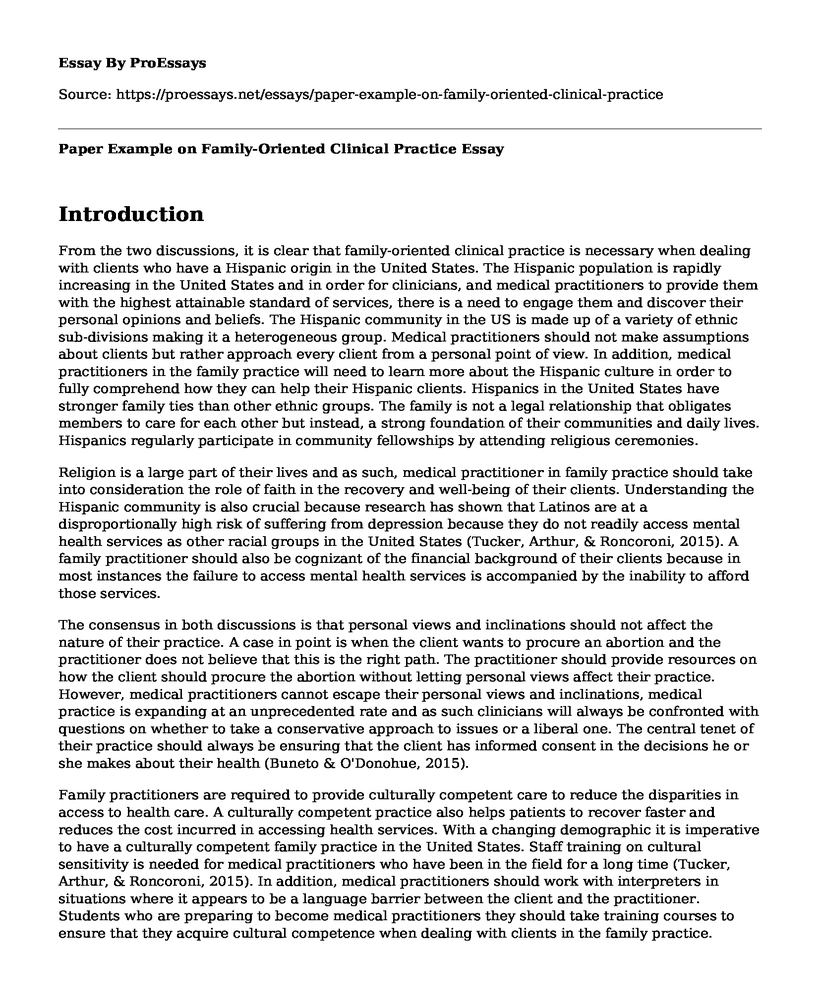Introduction
From the two discussions, it is clear that family-oriented clinical practice is necessary when dealing with clients who have a Hispanic origin in the United States. The Hispanic population is rapidly increasing in the United States and in order for clinicians, and medical practitioners to provide them with the highest attainable standard of services, there is a need to engage them and discover their personal opinions and beliefs. The Hispanic community in the US is made up of a variety of ethnic sub-divisions making it a heterogeneous group. Medical practitioners should not make assumptions about clients but rather approach every client from a personal point of view. In addition, medical practitioners in the family practice will need to learn more about the Hispanic culture in order to fully comprehend how they can help their Hispanic clients. Hispanics in the United States have stronger family ties than other ethnic groups. The family is not a legal relationship that obligates members to care for each other but instead, a strong foundation of their communities and daily lives. Hispanics regularly participate in community fellowships by attending religious ceremonies.
Religion is a large part of their lives and as such, medical practitioner in family practice should take into consideration the role of faith in the recovery and well-being of their clients. Understanding the Hispanic community is also crucial because research has shown that Latinos are at a disproportionally high risk of suffering from depression because they do not readily access mental health services as other racial groups in the United States (Tucker, Arthur, & Roncoroni, 2015). A family practitioner should also be cognizant of the financial background of their clients because in most instances the failure to access mental health services is accompanied by the inability to afford those services.
The consensus in both discussions is that personal views and inclinations should not affect the nature of their practice. A case in point is when the client wants to procure an abortion and the practitioner does not believe that this is the right path. The practitioner should provide resources on how the client should procure the abortion without letting personal views affect their practice. However, medical practitioners cannot escape their personal views and inclinations, medical practice is expanding at an unprecedented rate and as such clinicians will always be confronted with questions on whether to take a conservative approach to issues or a liberal one. The central tenet of their practice should always be ensuring that the client has informed consent in the decisions he or she makes about their health (Buneto & O'Donohue, 2015).
Family practitioners are required to provide culturally competent care to reduce the disparities in access to health care. A culturally competent practice also helps patients to recover faster and reduces the cost incurred in accessing health services. With a changing demographic it is imperative to have a culturally competent family practice in the United States. Staff training on cultural sensitivity is needed for medical practitioners who have been in the field for a long time (Tucker, Arthur, & Roncoroni, 2015). In addition, medical practitioners should work with interpreters in situations where it appears to be a language barrier between the client and the practitioner. Students who are preparing to become medical practitioners they should take training courses to ensure that they acquire cultural competence when dealing with clients in the family practice.
References
Buneto, L., & O'Donohue, W. (2015). Is Culturally Sensitive Cognitive Behavioral Therapy an Empirically Supported Treatment?: The Case for Hispanics. International Journal of Psychology and Psychological Therapy, 405-421. Retrieved from http://www.redalyc.org/pdf/560/56041784007.pdf
Tucker, C., Arthur, T., & Roncoroni, J. (2015). Patient-Centered, Culturally Sensitive Health Care. American Journal of Medicine, 63-77. Retrieved from http://journals.sagepub.com/doi/abs/10.1177/1559827613498065
Cite this page
Paper Example on Family-Oriented Clinical Practice. (2022, Jul 08). Retrieved from https://proessays.net/essays/paper-example-on-family-oriented-clinical-practice
If you are the original author of this essay and no longer wish to have it published on the ProEssays website, please click below to request its removal:
- Importance of Becoming a Global Citizen Essay
- Essay Example on Emotional Labor in the Workplace: Effects and Attitudes
- Essay Example on Empathy: An Intrinsic Feeling that Needs to be Enhanced
- Essay Example on the Social Significance of 'Face' in Chinese Culture
- The Development of Ego and Id: A Psychoanalytic Perspective - Essay Sample
- Free Report on INTJ Personality Type: My Jung Test Results
- Paper Example: Nature vs. Nurture on Child's Development







